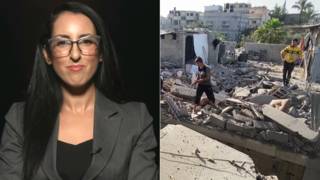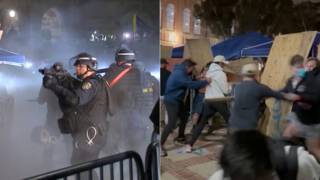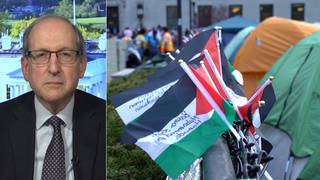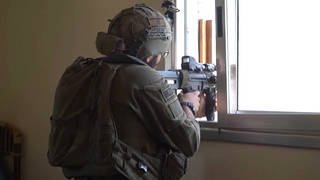
Related
Guests
- Joshua Sklargraduate student at the University of Texas at Austin and an organizer with Jewish Voice of Peace Austin.
- Sarah Kingpart of Columbia University Apartheid Divest and one of the students arrested at the Gaza Solidarity Encampment on the Columbia University campus.
Student protests calling for university divestment from Israel and the U.S. arms industry have rocked campuses from coast to coast. The nonviolent protests, which have been characterized as “antisemitic” for their criticism of Israel, have been met with an intensifying police crackdown as university administrators threaten academic discipline and arrests. On Wednesday, local and state troopers violently arrested dozens at the University of Texas at Austin. Meanwhile, Republican House Speaker Mike Johnson visited Columbia University in New York City, the site of a high-profile student encampment and one of the first to be met with police action, where he called on university president Minouche Shafik to resign. We hear from two Jewish students involved in protests at their schools. Joshua Sklar, a graduate student at the University of Texas at Austin and an organizer with Jewish Voice of Peace Austin, says concern over campus antisemitism is insincere, and that, in fact, “The people who are being targeted are Muslim students, Arab students, and especially Palestinian students.” Sklar and Sarah King, a member of Columbia University Apartheid Divest who was arrested at the campus’s Gaza Solidarity Encampment, also point out that a large percentage of protesters are Jewish anti-Zionists concerned about their safety from state repression. “The threat is really coming from Columbia University, which has set the police on hundreds of its students who are entrusted to its care,” says King.
Transcript
AMY GOODMAN: This is Democracy Now!, democracynow.org. I’m Amy Goodman, with Nermeen Shaikh.
NERMEEN SHAIKH: Protests against Israel’s assault on Gaza have rocked campuses from coast to coast over the past week amid an intensifying police crackdown. At the University of Texas in Austin, school officials called in local and state police, including some on horseback, who violently broke up a student encampment on campus. At least 50 people were arrested, including at least one journalist. Some faculty at UT Austin are going on strike today to protest the police crackdown.
Meanwhile, the Gaza Solidarity Encampment at Columbia University continues a week after over a hundred students were arrested in a failed attempt by the university administration to clear the demonstration. University President Minouche Shafik had said on Tuesday — had set on Tuesday a midnight deadline to reach an agreement on clearing an encampment, but the school extended negotiations for another 48 hours. On a visit to campus Wednesday, House Speaker Mike Johnson called on Shafik to resign.
SPEAKER MIKE JOHNSON: I am here today joining my colleagues in calling on President Shafik to resign if she cannot immediately bring order to this chaos. As speaker of the House, I am committing today that the Congress will not be silent as Jewish students are expected to run for their lives and stay home from their classes, hiding in fear.
AMY GOODMAN: For more, we’re joined in New York by Sarah King, member of Columbia University Apartheid Divest. She is Jewish, one of the students arrested at the encampment last week who’s now suspended. We’re also joined by Joshua Sklar, a graduate student at University of Texas Austin, a member of Jewish Voice for Peace Austin, who was at Wednesday’s protest.
We welcome you both to Democracy Now! Josh, there were more than 50 arrests at UT Austin. If you can respond to the House speaker, who’s saying that these encampments around the country are antisemitic and pro-Hamas?
JOSHUA SKLAR: It’s absolutely ridiculous. I was there with a contingent of Jewish students, and we were received very warmly. There were even Jewish Zionists there, and they were not harassed at all. In fact, I would say that they probably felt safer than the majority of protesters.
NERMEEN SHAIKH: Sarah King, if you could describe what’s happening now at Columbia University and your own position? You were suspended?
SARAH KING: Yes, I was one of the over 100 students who was arrested as part of a peaceful protest in the Gaza Solidarity Encampment, and I’m one of the student who’s been suspended, as well, so I’m currently not allowed to be on campus. And I have to say it’s — the camp itself is very beautiful. It’s been a real place of interfaith celebration and solidarity, in support of the people of Gaza, who are now at over 200 days of genocide. But, you know, the threat is really coming from Columbia University, which has sent the police on hundreds of its students who are entrusted to its care.
AMY GOODMAN: And can you talk, Sarah, about what’s happened, how you got suspended and your treatment? I’ve been talking to a number of Columbia and Barnard students who said that some of them were given 15 minutes to get out of their dorm, and your meal card canceled, as you’re banned from campus, as well.
SARAH KING: Yeah, that’s exactly right. I’m one of the lucky ones, because I live off campus. But many students live in Columbia housing, and so they were evicted from their homes or locked out from their homes, probably illegally in many cases. We’re looking into it. And they lost access to their normal food. I had an undergraduate who is low-income and was staying with me, because she was evicted with no notice and lost access to her meal plan.
And it’s really very concerning the way Columbia uses the threat of — initially it was just — “just,” quote-unquote — the threat of housing, the threat of loss of food to try to — you know, as a cudgel to get students into the correct political line that is best for its pocketbook, its investment portfolio. And now they’re threatening to set the National Guard on us, risking another Jackson State, another Kent State, where students have been killed because the National Guard were set on students. And they’re willing to risk the threat of violence at their hands because we’re not, you know, consistent with what’s best for their board of trustees or for their portfolios.
NERMEEN SHAIKH: And, Sarah, what about your response to Mike Johnson being invited to speak at Columbia University on campus yesterday?
SARAH KING: Yeah. I mean, first, I think it’s shameful that he was allowed there. Like, I myself am not allowed on campus. I’m, you know, one of many talented and promising students with bright futures who have been banned from campus, but Mike Johnson, who is an open racist and white supremacist, along with people like Gavin McInnes, the head of the Proud Boys, they were welcomed on campus yesterday.
And to me, that really tells the story of what’s at stake here, which is that, you know, the students fighting for Palestinian liberation are part of an interracial coalition — so many Jewish students, Muslim students, Black, Brown, Arab students — working together for the cause of freedom, on one side, and then, on the other side, you have political opportunists, like the House speaker, who, you know, will take any excuse they can get to come after that kind of interfaith, multigenerational coalition fighting for freedom. And right now it happens to be under the guise of something like antisemitism. But, you know, there’s no substance to it at all. And I think anybody who came to campus and saw, the worst prosecution that the Jewish students on campus are facing is from Columbia University. We were disproportionately banned by Columbia because so many of us are part of the Gaza Solidarity Encampment trying to prevent a genocide in our name.
AMY GOODMAN: And, Joshua Sklar, wrote a piece in The Austin Chronicle. “We need a ceasefire now,” it was called, the subtitle, “Anti-Palestinian violence is not 'on the other side of the globe.' It’s here in Austin, too.” If you can talk about that and how protesters were treated yesterday? You had riot police on horseback?
JOSHUA SKLAR: Yeah. I think that there’s been this narrative that there’s been rampant antisemitism. And this simply is not the case. The people who are being targeted are Muslim students, Arab students, and especially Palestinian students. Police came in on horseback, and they attacked protesters. I heard from other students that during an earlier part of the protest, they were clearly targeting Brown people and women. I wasn’t there personally, but this is what I heard.
AMY GOODMAN: Let me ask Sarah King a final question. We have 10 seconds. And that is, 48-hour extension goes ’til tonight. What are the plans? Ten seconds, Sarah.
SARAH KING: You know, I think most of the people at the encampment have already agreed to risk arrest, and they won’t move unless moved by force or until Columbia concedes to our demands, which are for divestment, amnesty and financial transparency.
AMY GOODMAN: We want to thank you both for being with us, Sarah King, Columbia University Apartheid Divest, and Joshua Sklar at UT Austin. I’m Amy Goodman, with Nermeen Shaikh.











Media Options